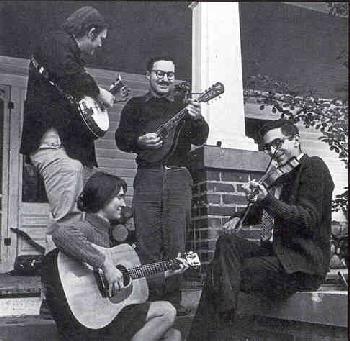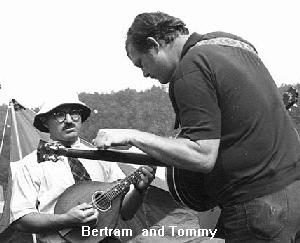
OUR COLLECTION
CD:
Traditional Dance Tunes
CD:
Hollow Rock Legacy
Alan
on Hollow Rock 1997
Alan
on Hollow Rock 1968
Tommy
introduces the band
The
Henry Reed Collection
CD:
A Henry Reed Reunion
Alan
in the Durham Indy
Tommy:
Coming to Hollow Rock
Review
by Eugene Chadbourne
see also...
Fuzzy
Mountain String Band Collection
by Alan Jabbour
We can no longer say exactly when the Hollow Rock String Band was
created. We started playing together in the mid-1960s. By 1966
we were probably “a band,” though it is not certain when we adopted our
name.  The
band included Tommy Thompson on five-string banjo, Bobbie Thompson on guitar,
Bertram Levy on mandolin, and me on fiddle. A circle of other friends
from the Durham/Chapel Hill area played with us, yet it was somehow clear
who was “the band” and who was “the circle.”
The
band included Tommy Thompson on five-string banjo, Bobbie Thompson on guitar,
Bertram Levy on mandolin, and me on fiddle. A circle of other friends
from the Durham/Chapel Hill area played with us, yet it was somehow clear
who was “the band” and who was “the circle.”
The original LP recording was conceived in 1967, recorded hastily
at a Durham studio, and turned over to Ken Davidson of Kanawha Records.
In spring of 1968 the album appeared—too late to be heard by Henry Reed
of Glen Lyn, Virginia, whose fiddling comprised the largest single creative
influence on the album. Then the band dissolved. Bertram and
I left for our separate futures in California. Bobbie, whose wonderful
guitar runs adorn this album, and some of our musical circle formed the
Fuzzy Mountain String Band, before her life was cut short by an automobile
accident. Others joined Tommy to form the Red Clay Ramblers.
Now a generation has passed. Bertram still makes music in
his new home, Port Townsend, Washington—though he is more likely to make
it on fiddle, banjo, or concertina than mandolin. Tommy has retired
from a splendid career as musician, bandleader, actor, and playwright.
I play some music from time to time.  But
we rarely play together and rarely play the tunes on this record.
Yet the tunes have achieved a life of their own among younger musicians
around the country—and, in the case of tunes like “Over the Waterfall,”
around the world. If imitation is the highest form of flattery, the
renewed life of these grand old tunes in our generation is satisfying indeed.
But
we rarely play together and rarely play the tunes on this record.
Yet the tunes have achieved a life of their own among younger musicians
around the country—and, in the case of tunes like “Over the Waterfall,”
around the world. If imitation is the highest form of flattery, the
renewed life of these grand old tunes in our generation is satisfying indeed.
Yet their diffusion owes at least as much to “the circle” as to
“the band.” And we are likewise mindful of our debt to the fiddlers from
whom we learned these tunes—Henry Reed, and also Vaughn Marley, Harlan
Coble, Lonnie Corsbie, Ross Miller—as well as the wider circle of musicians
whose influence helped shape our music. The musicians who taught
us these tunes have all passed away. On the other hand, Henry Reed’s
children, grandchildren, and great grandchildren are playing his tunes
now. Bands are for but a while, but circles and tunes are forever.
Listening again to the first Hollow Rock String Band album, after
nearly thirty years, I am struck by two things.
First, the album has something of that boundless energy and enthusiasm
that, I now  know,
comes from youth. With benefit of hindsight, I also realize that
the enthusiasm was not just ours, but was shared by a generation of young
musicians who fell in love with old-time instrumental music. Our
enthusiasm touched faraway places. Eventually many young musicians
from the home region of these tunes came to share the enthusiasm.
know,
comes from youth. With benefit of hindsight, I also realize that
the enthusiasm was not just ours, but was shared by a generation of young
musicians who fell in love with old-time instrumental music. Our
enthusiasm touched faraway places. Eventually many young musicians
from the home region of these tunes came to share the enthusiasm.
Second, listening to the tunes themselves reminds me how right we
were in our enthusiasm for them. The older generation of West Virginians,
Virginians, and North Carolinians from whom we learned these tunes had
splendid repertories—thousands of great tunes—and played them with a special
grace and beauty. It seemed unthinkable, to us young enthusiasts,
that such great cornucopia of art should be neglected and forgotten.
Happily the rising generation of musicians has helped ensure that it won’t
be forgotten. The creative stream of tradition courses on, and all
of us are part of it.
January, 1997 (from
the CD)
Next
page for information about the Hollow Rock CD Traditional Dance Tunes
New
CD! (2004) Hollow Rock Legacy - double CD includes
the second Hollow Rock LP, The Hollow Rock String Band and Sandy's Fancy
Look below for
some recent news concerning Hollow Rock musicians
Hollow Rock String Band CD - Traditional Dance Tunes
Coming to Hollow Rock
Fuzzy Mountain String Band
Jesse Thompson's Letters
The American Folklife Center at the Library of Congress presents
FIDDLE TUNES OF THE OLD FRONTIER: THE HENRY REED COLLECTION
online through the Library of Congress American Memory Web
A note about the Henry Reed site:
Alan Jabbour has just unveiled (April, 2000) a enormous document devoted to the life and work of the fiddler Henry Reed. This site includes much about the origins of the current vibrant revival of traditional fiddle music, which Alan describes as an historical hourglass, where men of Mr. Reed's generation became the "neck" of the glass, the music flowing down thru them and then out again to many---and in the case of Mr. Reed and his wonderful tunes, out around the world. Mr. Reed's music, once Alan had "discovered" it, formed the core repertoire of the Hollow Rock String Band, the Fuzzy Mountain String Band, and to some extent the instrumental repertoire of the early Red Clay Ramblers. As all these bands recorded, the tunes found their way everywhere--I saw a Fuzzy Mountain String Band album in the bookshelf of Israel Young, a folk expatriate who'd hired the Red Clay Ramblers to play in Stockholm in 1977. I commend this wonderful Henry Reed site, then, to all interested readers here. Give yourself plenty of time with it. --Bill Hicks
A HENRY REED REUNION
"The CD has (if I may say so) attractive fold-out cardboard packaging (no jewel case). The package includes my essay describing our relationship to Henry Reed, telling how we came to make this CD together, and talking about some of the tunes. There are some photographs, too.
"THE TUNES.
The CD has 21 tracks and 22 tunes, all from Henry Reed:
Shoes and Stockings,
Jump Jim Crow, Stony Point,Reel in A, Schottische, George Booker, James
Reed’s Favorite, Georgia Camp Meeting, Shady Grove, High Yellow, Jawbones,
Peekaboo Waltz, Ebenezer, Frosty Morning, The Girl I Left behind
Me/I’m Going Away to Leave You, Going to Tennessee, Hell among the Yearlings,
Santa Anna’s Retreat, Quince Dillion’s High-D Reel, Betsy, Flop-Eared Mule,
Dean Reed’s Favorite
"THE PERFORMERS. My mentor Henry Reed (1884-1968) taught me these tunes and many more when I visited his home in Glen Lyn, Virginia, in 1966-67. My recordings of him, along with an accompanying essay, photographs, and musical analysis, are available on the Library of Congress website FIDDLE TUNES OF THE OLD FRONTIER: THE HENRY REED COLLECTION.
"In the 1960s I taught Henry Reed’s tunes to a group of musicians in Durham and Chapel Hill, NC. Some of us became the Hollow Rock String Band, which introduced some great Henry Reed tunes to the world with an album in 1968, just after Henry Reed passed away. Bertram Levy was a member of that band and carried the tunes off to the West Coast in 1968. He is now a doctor in Port Townsend, Washington, where he founded the Festival of American Fiddle Tunes in 1977.
"James Reed learned to accompany his dad on guitar when he was a youngster in Glen Lyn, and Henry Reed carefully instructed him about the proper chords. A retired boilermaker, he now lives in Parkersburg, West Virginia. He and I have been playing together since the 1990s. We gather every Labor Day weekend at Dean Reed’s house in Rich Creek, VA, for a musical reunion with other members of the family. On Labor Day weekend in 2000 I took Bertram with me, and the rest is – well, music."
HOW TO ORDER. You can purchase copies of A HENRY REED REUNION directly from Alan. The cost of the CD is $15, plus $1.50 for postage and handling. Write Alan for the address, and be sure to include yours!
Alan Jabbour and Jim Watson - House Concert
January 25, 2001, Durham, North Carolina
"It was very much vintage Alan Jabbour--each tune (all tunes except for two songs from Jim Watson) annotated with stories of the musician it came from, mostly Henry Reed, but also others, including Stokes County, NC, fiddler John Lewis. Alan's playing gets more subtle with time--small variations within the framework of the original style, great power, and some humor from time to time--he must have found six or seven ways to play a 'high-D' on one tune from Maestro Reed. Jim's backup was, of course, tasteful. At the end, banjoist Joe Newberry arrived and jumped in for a rousing 'Liza Jane.' The room was packed; the smiles were constant. It was a great time."
- The concert was sponsored by Dave Tilley's Cosmic Hoedown
- Related article in the Independent Weekly by David Potorti: Unbroken Circle: Musician and scholar Alan Jabbour on Hollow Rock's influence over the years
- Hollow Rock String Band according to Eugene Chadbourne in the All Music Guide
| Red
Clay Ramblers 1972-1981 |
[![]()

RCR_fan@hotmail.com
January
24, 2002
updated
July 22, 2002, Tommy's birthday
and
recently August 26, 2013